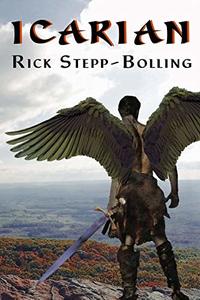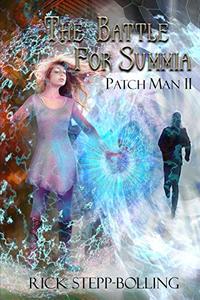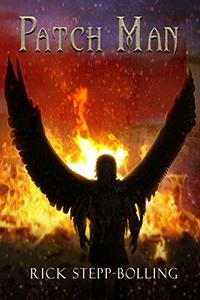Rick Stepp-Bolling Interview Published on: 25, Sep 2020
 Where were you born? How has moving to a new place changed your life for the better?
Where were you born? How has moving to a new place changed your life for the better?
I was born in Plattsburgh, New York, but I have no memories of it because my parents moved to Tempe, Arizona shortly after I was born. My father was a professor at Arizona State, then San Diego State and finally at Cal State Los Angeles, so we moved a number of times in my childhood. I’ve spent most of my life in Los Angeles County (Glendora and San Dimas), but after I retired my wife and I moved to Ramona, California, to be closer to my daughter and her family. Ramona offers us a larger piece of property (four and a half acres) for our animals, but because we live on a hillside, it also offers more cardio workouts when feeding/cleaning the horses, dogs, and pig. This is a rural, agricultural area, so there’s more room than one would associate with other cities in San Diego County. What I enjoy most about Ramona is the golfing and the clean air. That’s definitely been a plus.
How do you support yourself while becoming a full-time writer?As both my wife and I are retired educators, we have our retirement funds to support us. Our house is paid off so our major expenses are our animals, golfing, and my daughter’s house improvements. When I was working as a college professor, I wasn’t able to be that full-time writer I always envisioned myself to be. I dabbled with poetry and short stories, but plunging into the world of novels was not something I was courageous enough to do until after retirement. I am certainly sympathetic to all those writers who are full- time writers and have a family to care for as well.
What is the difference between the science fiction and fantasy genres?Science Fiction blends science with fiction either in a contemporary setting or a futuristic setting. Science is the most important element of that genre, so writers have to have some science background to create a believable story. Think Star Trek. Much of the material on that program came from theoretical science. The writers utilized ideas such as photon torpedoes, holo-decks, phasers, cloaking devices, matter-antimatter generation, and impulse engines from what scientists imagined technology of the future might look like. Combine that with fictionalized stories and you can understand why the series was so successful. Books that are able to create futures based on scientific thinking such as Andromeda Strain, Enders Game, Gem, The Uplift Wars, and A Canticle for Leibowitz usually do so with a strong science background. Fantasy, on the other hand, creates settings using imagination or mythology. You only have to look at Tolkien’s Lord of the Rings to see how he combined the world of Middle English with the mythology of elves, dwarfs, dragons, and trolls to create a masterpiece of fantasy. Of course the fantasy genre can be divided into sub genres such as High or Epic Fantasy, Low Fantasy, Magical Realism, Sword and Sorcery, and a number of others. Each has its own set of parameters and reader expectations.
A kind of middle ground between Fantasy and Science Fiction has been called Speculative Fiction. Speculative Fiction is not heavily endowed with only science nor does it only have elements of fantasy, but it will often create worlds totally from the writer’s imagination. Dune is what I would call Speculative Fiction. Most of my writing would also fall into this category. I use some science background, but I also have characters who have power or magic. True Science Fiction writers would probably frown at what happens in Summia or Imperiana, but I enjoy dipping my toes (or ink) into both genres.
What are some fun things to do in Ramona, California?Ramona is a throwback to rural towns of old. There is an actual Main Street with independently owned shops and restaurants. Every Thursday people show up on Main Street to watch a parade of antique or renovated cars from the 50s, 60s, and 70s. On Halloween, the local stores and shops offer candy to all the costumed children--accompanied by their costumed parents—who fill the street for several hours. There’s a local fair with children showing their pet goats and sheep. There’s a grape stomping contest. Every October the local library sponsors a local writer’s day where writers from the area talk about their books and mingle with local readers. Ramona has a wolf sanctuary and just down the way there is a camel farm where you can ride and feed camels. About 24 miles away is the quaint town of Julian, a popular tourist attraction, especially during the fall when apple and berry pies are made. There are two excellent golf courses in Ramona—Mt Woodson and San Vicente. People ride horses, walk dogs, exercise at the local gyms or bicycle on the hilly roads. And because Ramona is not far from downtown San Diego, there is everything a major city has to offer including wonderful beaches.
Who inspired the character of Ka, half raptor and half man in "Icarian"?The original inspiration for Ka was Icarus of Greek mythology. If you remember, Icarus had his father create waxed feathers and attached them to his arms so he could fly but when he came to close to the sun, the wax melted and he fell into the ocean and drowned. That said, Ka, in Patch Man, is half raptor and half man, but is controlled by Imperial forces. When he is released from his servitude to Imperiana by Var, the patch man, he becomes one of the mythical figures in the series and forms a strong bond with Meesha, the young one-armed girl who eventually leads Summia to victory. Once I had finished writing the Patch Man trilogy, I wanted to explore some of the backstories of a few of the characters. Icarian is Ka’s backstory. Icarian describes how he became the most distinguished flyer in his rookery and how he was betrayed by Imperiana. Such is the beginning of many a tragic character, but Ka literally and figuratively flies above his hatred and becomes a true hero. Just a quick promo: I also wrote the backstory of Ulan, the female assassin in Patch Man. That will be the next book in the series once I go through all the review and editing processes. It’s probably my favorite of all the Patch Man books.
In Patch Man, we have magic, adventure and near death experiences mixed with subtle humor. What inspired the plot of the story?I love the world of magic and all its possibilities, but I also live in a real world filled with real problems. Originally, I wanted to make a comment about the futility of war and its destructive nature for all those who are war’s victims. I used a Middle East background much like Herbert did in Dune, but I also had the memories of the Iraqi wars and what that did to the inhabitants of Iraq. That may have been my initial thinking when I started the book, but I utilized the Labyrinth’s portals into other worlds to make additional comments about religion, family, ecology, and power, and how each can have it’s positive and negative effects on society. I would love to have magic solve our current need for self-destruction in wars around the world, but sadly, outside of compassionate organizations like Doctors Without Borders, UNICEF, and the Red Cross, we have little magic.
How was the land of Summia created?As I said, Summia was originally based on a Middle Eastern country, but it could have been any country that has struggled to survive in a war with a larger country. Think of Afghanistan and its fight with Russia or Vietnam and its fight with France or the USA. But Summia is a desert country, so I needed my own background of deserts (Mojave, Arizona, most of Central Southern California) to visualize what that world would look like. Summia needed its own religion, its own culture, its own heroes to become the Summia in my head and the Summia that would dare to challenge the technologically superior Imperiana. What I did differently with this battleground was to create the Labyrinth underneath Summia. That maze had different purposes, but I needed a vehicle to allow the characters to enter parallel worlds and that’s where world building really becomes challenging. Another interesting aspect of Summia is the sand maelstroms. These are giant eddies in the sand acting much like whirlpools in water. Survival in Summia is something to be worked at. It doesn’t come easily.
What challenges did you face while writing your book, "The Battle for Imperiana (Patch Man Book 3)"?In Patch Man, the first book of the series, I needed to build a world and an army of characters who were strong enough to be labeled survivors. In the second book, Battle for Summia, I needed to create an army from different worlds who came to aid the Summian cause and free it from an Imperial presence. In the third book, The Battle for Imperiana, I needed closure for the world war. So what problems did I face? How do I get my main characters to travel from Summia to Imperiana—halfway around the world without modern technology? Next, I needed proper motivation for Meesha’s powers. Having the love of her life, Ten and her adopted mother, Zefa captured by Imperiana was certainly motivation enough. I also needed these characters to see that Imperiana was not a war-like nation and that there were good people there doing good things for others. Finally, I needed the leader of Imperiana to be seen as someone who actually thought he was doing the right thing for his people, misguided as that might have been. There were a lot of challenges that hopefully I was up for in the writing of the novel.
What are your favorite science fiction novels, and what is it that makes them so good?I think I’ve mentioned a few of my favorites already. The Uplift Wars by David Brin is a wonderful book. David takes the concept (from George Bernard Shaw, no less) that other animals (whales, apes, dogs) will one day match the intelligence of humans. I had the honor of talking with David at our college’s Writers Day, and we discussed his fascination of creating future worlds that were scientifically possible. At the time David was teaching science at UC Irvine so he certainly knew his stuff. Any of Isaac Asimov’s novels are great reads, but I would recommend the Foundation Trilogy. Isaac, of Russian descent, taught biochemistry at Boston University, so he knew his science. He combined that science with a masterful story telling technique to create one of the all time great science fiction trilogies. I’m going to throw Frank Herbert’s Dune into the science fiction category although many would disagree. I love the book (not the series, just the book). Dune was perhaps the first science fiction book to utilize an ecology theme, so I love it just for that. However, Dune also explores questions of religion, politics and war, some of the same themes I explore in my novels.
Have you ever fostered rescue animals to socialize them and help get them ready for adoption?As you probably know, rescue animals are a part of our lives. We have three rescue horses, seven rescue dogs, a rescue pig, three rescue turtles, a rescue cat, and tortoise, so we are quite familiar with a variety of animals. We were asked to foster a pair of newborn puppies who had been left outside of a pet store shortly after their birth. Our vet asked if we could care for them until they were weaned. My wife hand nursed them until they were old enough to eat on their own. By then they were a part of the family and there was no way we were giving them back. Tess and Cole are with us today. A newborn longhorn steer was in a similar situation. We had to nurse him until he was old enough to make it on his own. Bubba, the steer, was eventually given to a rancher in Northern California with the promise he would never sell or butcher him. There have been a variety of other dogs found in the hills or abandoned by their owners that we have rescued and found homes for. Most were already socialized, so that wasn’t a problem. We take rescuing seriously, so most of the animals wind up staying with us where they find a forever home, food, care, and love.
What's the best way to write a great science fiction book? What should the author be careful about?I’m going to alter this question slightly and substitute Speculative Fiction for Science Fiction. I would need a stronger background in science to actually write pure science fiction. I think World Building is the foundation for any strong speculative fiction writing. The author needs to create a world that is different from anything that has been written about previously, and if you’re familiar with the world of science or speculative fiction, that’s not an easy task. The conflict in the book may be familiar as conflicts tend to be universal in nature, but the setting, the world where the action takes place should be unique. Using worlds that have been built by other authors does nothing to create a new vision, a sense of excitement for the reader. Another element in creating a strong book is the characters. Characters drive the story. If the reader can’t relate to the characters, they are probably not going to enjoy the book. Again, a major caution with characters is creating a stereotypical character with no dimension. Characters are like real people. They have their strong points and they have faults. Antagonists should not be pure evil and protagonists should not have halos hanging over their heads. A final caution is the author should not preach about their themes. Long harangues about the evils of autocracy, for example, become boring. The theme should be brought out in what the characters do or don’t do, not in speeches by the author thinly disguised as a character.
Would you still want to be called a professor even after you have retired as a professor?When I taught writing at a community college, I gave my students the option of calling me Professor Stepp-Bolling or Rick. I wasn’t into titles for the purposes of prestige. It was all about the comfort level for students. Some students felt more comfortable calling me, Professor Stepp-Bolling and some students felt comfortable calling me Rick. I just asked that they didn’t call me Professor Boring. Now that I’m retired and have moved to a new community, most people don’t know that I was a professor and that’s fine. They just know me as Rick.
How do you take the good and the bad reviews that come your way?All reviews I take with a large grain of salt. Sometimes friends write reviews and they are trying to please me, or at least, trying not to upset me. Those reviews I mentally eliminate. The positive reviews I receive from readers I have no connection with are the ones that keep me writing, keep me focused, and keep me excited about what I’m doing. I want to reach out and hug those people. Negative reviews can be useful as well if the reader has a point to make; for example, the main character did not seem to be believable, or, the dialogue in the story was unrealistic. I’ll take those criticisms seriously and look at the book in a different light or maybe change my approach in the current book I’m writing. If more than one review says the same thing, then I’ll certainly be more aware of that criticism in my future writing. And isn’t that the purpose of the review in the first place? I realize, as an author, reviews are critical in getting more people to read my books, but they have other functions as well. When I was teaching, students would regularly review professors (ratemyprofessor.com). Reviews were largely from students who loved the class or who hated it. A majority of students didn’t bother to review me, but I took the negative reviews seriously. I would actually show them to my students and say, “This is one student I failed to help. Don’t let me fail again.”
Which is the next book you are working on?Well, I’m editing the first book outside of the Patch Man series entitled, Gray Riders. It’s very much in the fantasy genre with castles, dragons, and sorcerers. The idea behind it is that Grays (horses) are bonded for life with their riders and they become the protectors of certain castles. What makes the story unique is that it’s told from the horse’s perspective. I’m also just starting the sixth book in the Patch Man series. In book five, I left the ending with some uncertainty, so in book six, I needed to find closure for some of those problems the characters encountered.
When did you join AllAuthor? What has your experience been like?I joined AllAuthor about a year ago and couldn’t be more pleased. The GIFS they create are just one example of how they help authors reach their potential readers. The staff is personable and respond to any questions that may arise. This interview is an excellent example of how they relate to authors. Keep up the great work!
Share Rick Stepp-Bolling's interview
Born in Plattsburgh, New York, Rick Stepp-Bolling is a retired professor of writing and a full-time writer of science fiction, fantasy, and poetry. The author does an amazing job on characters, plot, and the scenery. Well-defined and quick-witted characters in constant action remain the hallmark of author Stepp-Bolling's tales.





